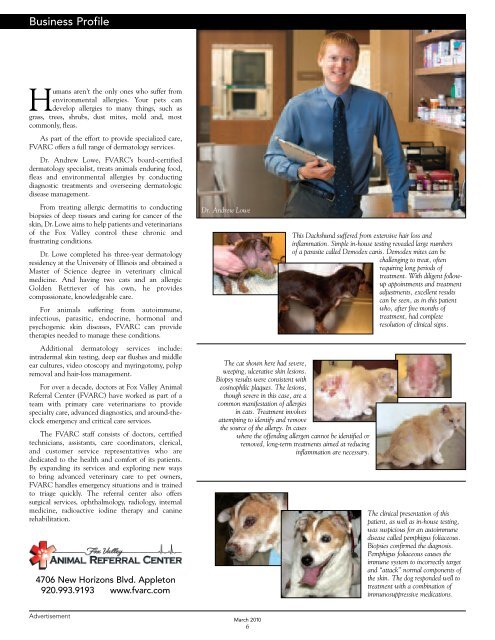Create successful ePaper yourself
Turn your PDF publications into a flip-book with our unique Google optimized e-Paper software.
Business Profile<br />
Humans aren’t the only ones who suffer from<br />
environmental allergies. Your pets can<br />
develop allergies to many things, such as<br />
grass, trees, shrubs, dust mites, mold and, most<br />
commonly, fleas.<br />
As part of the effort to provide specialized care,<br />
FVARC offers a full range of dermatology services.<br />
Dr. Andrew Lowe, FVARC’s board-certified<br />
dermatology specialist, treats animals enduring food,<br />
fleas and environmental allergies by conducting<br />
diagnostic treatments and overseeing dermatologic<br />
disease management.<br />
From treating allergic dermatitis to conducting<br />
biopsies of deep tissues and caring for cancer of the<br />
skin, Dr. Lowe aims to help patients and veterinarians<br />
of the <strong>Fox</strong> Valley control these chronic and<br />
frustrating conditions.<br />
Dr. Lowe completed his three-year dermatology<br />
residency at the University of Illinois and obtained a<br />
Master of Science degree in veterinary clinical<br />
medicine. And having two cats and an allergic<br />
Golden Retriever of his own, he provides<br />
compassionate, knowledgeable care.<br />
For animals suffering from autoimmune,<br />
infectious, parasitic, endocrine, hormonal and<br />
psychogenic skin diseases, FVARC can provide<br />
therapies needed to manage these conditions.<br />
Additional dermatology services include:<br />
intradermal skin testing, deep ear flushes and middle<br />
ear cultures, video otoscopy and myringotomy, polyp<br />
removal and hair-loss management.<br />
For over a decade, doctors at <strong>Fox</strong> Valley Animal<br />
Referral Center (FVARC) have worked as part of a<br />
team with primary care veterinarians to provide<br />
specialty care, advanced diagnostics, and around-theclock<br />
emergency and critical care services.<br />
The FVARC staff consists of doctors, certified<br />
technicians, assistants, care coordinators, clerical,<br />
and customer service representatives who are<br />
dedicated to the health and comfort of its patients.<br />
By expanding its services and exploring new ways<br />
to bring advanced veterinary care to pet owners,<br />
FVARC handles emergency situations and is trained<br />
to triage quickly. The referral center also offers<br />
surgical services, ophthalmology, radiology, internal<br />
medicine, radioactive iodine therapy and canine<br />
rehabilitation.<br />
4706 New Horizons Blvd. Appleton<br />
920.993.9193 www.fvarc.com<br />
Dr. Andrew Lowe<br />
This Dachshund suffered from extensive hair loss and<br />
inflammation. Simple in-house testing revealed large numbers<br />
of a parasite called Demodex canis. Demodex mites can be<br />
challenging to treat, often<br />
requiring long periods of<br />
treatment. With diligent followup<br />
appointments and treatment<br />
adjustments, excellent results<br />
can be seen, as in this patient<br />
who, after five months of<br />
treatment, had complete<br />
resolution of clinical signs.<br />
The cat shown here had severe,<br />
weeping, ulcerative skin lesions.<br />
Biopsy results were consistent with<br />
eosinophilic plaques. The lesions,<br />
though severe in this case, are a<br />
common manifestation of allergies<br />
in cats. Treatment involves<br />
attempting to identify and remove<br />
the source of the allergy. In cases<br />
where the offending allergen cannot be identified or<br />
removed, long-term treatments aimed at reducing<br />
inflammation are necessary.<br />
The clinical presentation of this<br />
patient, as well as in-house testing,<br />
was suspicious for an autoimmune<br />
disease called pemphigus foliaceous.<br />
Biopsies confirmed the diagnosis.<br />
Pemphigus foliaceous causes the<br />
immune system to incorrectly target<br />
and “attack” normal components of<br />
the skin. The dog responded well to<br />
treatment with a combination of<br />
immunosuppressive medications.<br />
Advertisement<br />
March 2010<br />
6















